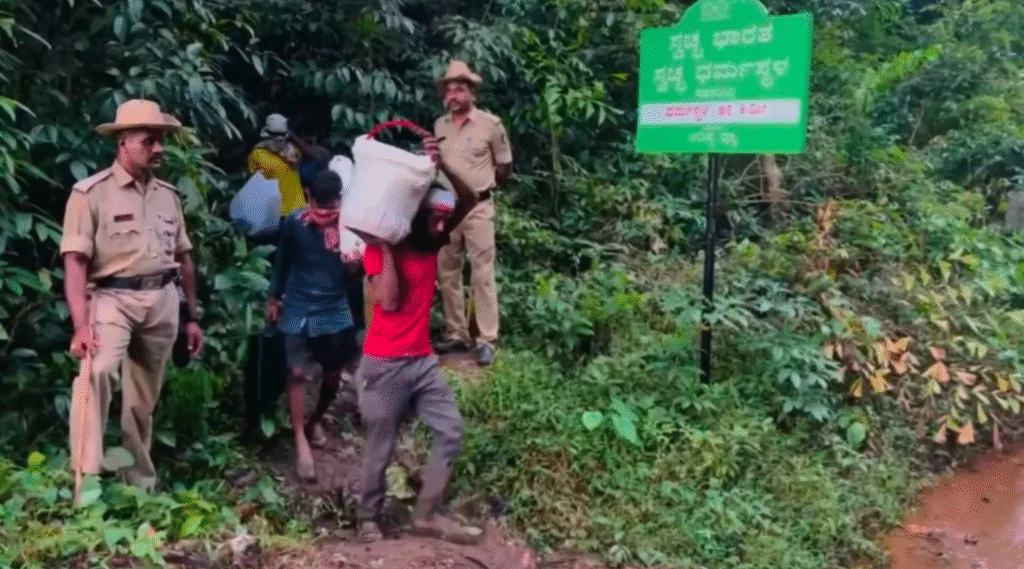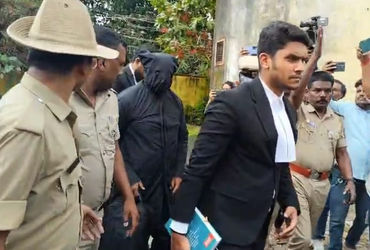Man Arrested for Indian Temple Rape Allegations
Indian temple rape allegations have sent shockwaves across Karnataka, as police arrested a man who earlier claimed he was forced to bury the bodies of hundreds of women and girls allegedly raped and murdered in the holy town of Dharmasthala. His explosive statement, along with physical evidence, prompted a Special Investigation Team (SIT) inquiry that has gripped the nation.
Background of the Indian Temple Rape Allegations
The town of Dharmasthala, home to the historic Manjunatha Swamy Temple, is one of South India’s most revered religious sites. Pilgrims arrive in thousands every day, seeking blessings from Lord Shiva’s incarnation worshipped here.
However, the man’s allegations cast a long shadow over this spiritual hub. According to his police complaint, he worked as a cleaner at the temple between 1995 and 2014. During those years, he claimed he was coerced into burying hundreds of bodies, many belonging to women who were brutally raped and killed.
He even alleged that minors were among the victims, deepening the horror surrounding the case.
Arrest and Perjury Charge
Police arrested the whistleblower on charges of perjury. According to SIT officials, his evidence and statements were inconsistent, particularly the human skull he produced as proof. Investigators stated the skull and bone fragments were not found at the burial spots he had originally pointed out.
This development marked a significant turn in the ongoing saga, leaving both locals and national observers divided over whether his claims reveal a hidden truth or a fabricated story.
Human Remains Discovered
Despite doubts, SIT investigators confirmed they uncovered human remains, including a skull and nearly 100 bone fragments, at two of the 13 locations the man identified. These remains have been sent for forensic testing to determine their origins.
The discoveries have kept the case alive in the public eye, as many demand answers to whether the remains prove the man’s allegations or simply belong to unrelated burials.

Spotlight on the Heggade Family
The temple has been managed for centuries by the Heggade family, an influential dynasty deeply respected across Karnataka. Current administrator Veerendra Heggade, who is also a Member of Parliament and recipient of the Padma Vibhushan (India’s second-highest civilian award), welcomed the SIT investigation.
In his official statement, Heggade stressed:
“We fully support the government’s inquiry. We have faith in the judiciary, and once the truth emerges, it will clear doubts and protect Dharmasthala’s reputation.”
He also rejected the cleaner’s claims as “impossible,” urging investigators to expose the reality once and for all.
Political Fallout in Karnataka
The allegations sparked an intense political storm in the Karnataka assembly. Opposition members from the Bharatiya Janata Party (BJP) accused the ruling Congress government of orchestrating a smear campaign against a revered Hindu religious site.
State Home Minister G. Parameshwara defended the inquiry, stating that the government’s sole intention was to uncover the truth.

“If nothing is found, Dharmasthala’s name will emerge even stronger. If something is uncovered, justice will be served to the victims,” he said.
This balance between faith, politics, and justice continues to fuel debates across India.
Media Frenzy and Public Reaction
The Indian temple rape allegations have dominated headlines across national and international outlets. Social media platforms are filled with debates: some demand accountability from religious institutions, while others accuse media and politicians of maligning Hindu traditions without conclusive evidence.
The case also drew attention from women’s rights organizations, who argue that any claims of sexual violence, no matter how shocking, must be investigated thoroughly, given India’s ongoing struggles with gender-based crimes.
Religious Sentiments and Social Impact
Dharmasthala is not just a temple town, it is a symbol of Karnataka’s cultural and spiritual heritage. Allegations of mass rapes and secret burials directly challenge its sanctity, leaving devotees torn between faith and disturbing accusations.
The unfolding case highlights India’s broader struggle to reconcile tradition with transparency, especially when powerful religious families and political parties are involved.
What Happens Next?
The SIT continues forensic testing of the remains found at Dharmasthala. The arrested man’s credibility is under scrutiny, but his allegations cannot be dismissed entirely given the physical discoveries.
As the investigation progresses, the people of Karnataka, and India at large, await clarity. Whether this case exposes one of the darkest scandals in temple history or proves to be a false alarm, it will leave a lasting mark on the country’s socio-political and religious landscape.
